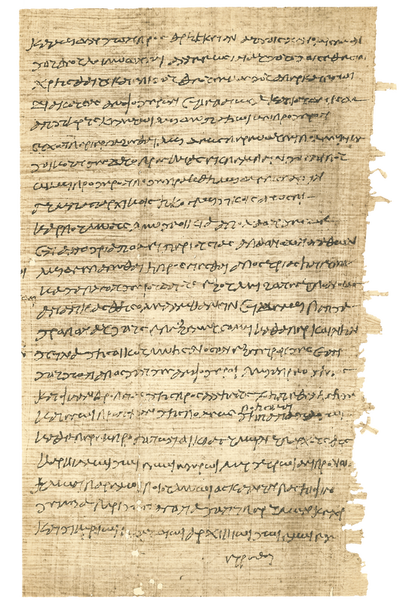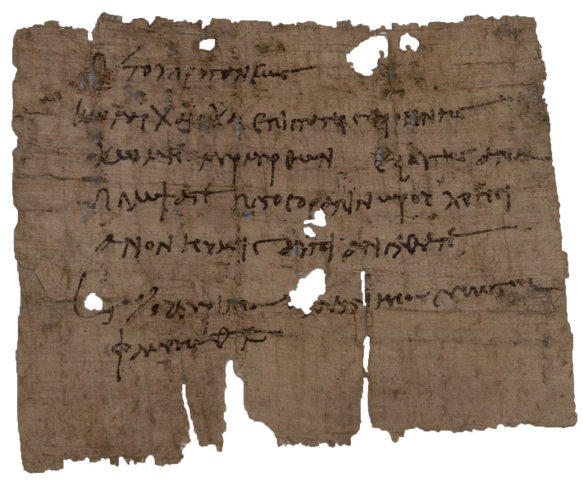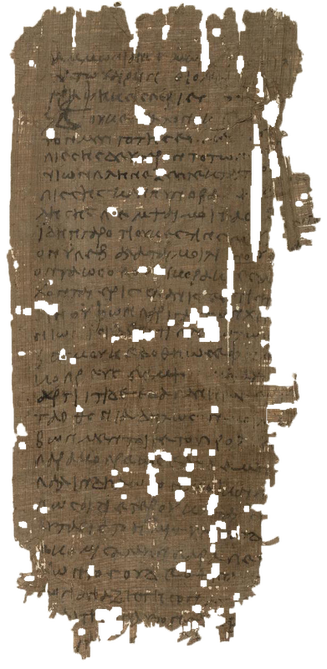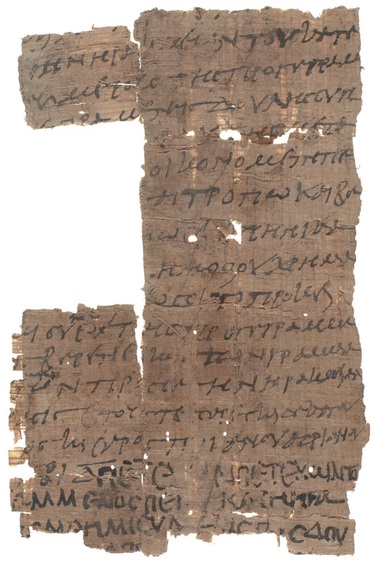 P.Lond. 6.1912, col. 5 (Claudius' Letter)
P.Lond. 6.1912, col. 5 (Claudius' Letter) In 1924, H. Idris Bell published a papyrus roll that was discovered in Philadelphia, on the northeast side of the Fayum in ancient Egypt. Now known by its publication number P.Lond. 6.1912, it was soon recognized that this papyrus was a copy of a letter from the Roman emperor Claudius (41-54) to the Greek embassy in Alexandria. The contents of this letter have contributed to its massive popularity among papyrologists and historians alike, because it gives us a glimpse of imperial policy and regional disputes in Egypt. In fact, it has received more studies than almost any other papyrus discovered in Egypt.
In his letter, emperor Claudius was responding to a letter sent from the Alexandrians in 41 CE who wrote for three main reasons: 1) to congratulate Claudius on his accession to the imperial seat, 2) to ask for certain favors, and 3) to have him settle a dispute between the Alexandrians and the Jews of the city. In the first part of the letter, the emperor addresses the various honors the Alexandrians had offered to him, such as the erection of statues. One of the interesting facets of this part of the letter is Claudius’ description of himself as “not wanting to be arrogant to men of my own day, for sacred things and the like are granted by every age to the gods along as special honors, in my opinion” (ll. 47-50). However, scholars have questioned whether we can take this description of Claudius' character at face value, since it may well have been politically motivated.
The section of the letter that has received the most attention comes at the end of the papyrus, in columns four and five: Claudius’ response to the feud between the Greeks and Jews. The Alexandrians’ question on this matter is often referred to as “the Jewish question.” Basically, Claudius sternly warns the Alexandrians that if they do not stop fighting with each other, he will be forced to intervene: “I shall be forced to show what a benevolent leader is when turned toward righteous rage” (ll. 80-81). He orders the Alexandrians to leave the Jews alone, because they have been inhabitants of the city “from a long time ago.” Additionally, they are to respect Jewish customs. As for the Jews, they are not to agitate, intrude in the contests, or “bring in Judeans from Syria or sailing down from Egypt.” Claudius was exercising good public policy, holding to a “perfectly judicial attitude” (Bell, 22). We learn from the prefect’s edict at the very beginning of the papyrus that not everyone in Alexandria was present to hear Claudius’ letter read out publicly. So, the prefect ordered that the letter be publicly posted in Alexandria, “so that man by man each understanding the letter you may wonder at the majesty of our god Caesar and for his goodwill toward the city be grateful” (ll. 7-11).
While the papyrus itself is not dated (almost certainly the original letter would have been), the edict is dated to 10 November 41, which offers a terminus ante quem, that is, a latest possible date for the papyrus. Our copy of Claudius’ letter is written on the verso of a long roll, whose recto bears the text of a tax register. There is a question as to why this letter turned up in Philadelphia in the Fayum in a first century tax archive of an official named Nemesion, son of Zoilos. Bell was of the opinion that the contents of the letter may have been of interest to the officials in Philadelphia, who could refer to it on matters related to Alexandrian citizenship.
What follows is an English translation of the section dealing with the “Jewish question.” For a complete English translation, see here; for the Greek text of the papyrus, see here. For further reading, see the following two works:
In his letter, emperor Claudius was responding to a letter sent from the Alexandrians in 41 CE who wrote for three main reasons: 1) to congratulate Claudius on his accession to the imperial seat, 2) to ask for certain favors, and 3) to have him settle a dispute between the Alexandrians and the Jews of the city. In the first part of the letter, the emperor addresses the various honors the Alexandrians had offered to him, such as the erection of statues. One of the interesting facets of this part of the letter is Claudius’ description of himself as “not wanting to be arrogant to men of my own day, for sacred things and the like are granted by every age to the gods along as special honors, in my opinion” (ll. 47-50). However, scholars have questioned whether we can take this description of Claudius' character at face value, since it may well have been politically motivated.
The section of the letter that has received the most attention comes at the end of the papyrus, in columns four and five: Claudius’ response to the feud between the Greeks and Jews. The Alexandrians’ question on this matter is often referred to as “the Jewish question.” Basically, Claudius sternly warns the Alexandrians that if they do not stop fighting with each other, he will be forced to intervene: “I shall be forced to show what a benevolent leader is when turned toward righteous rage” (ll. 80-81). He orders the Alexandrians to leave the Jews alone, because they have been inhabitants of the city “from a long time ago.” Additionally, they are to respect Jewish customs. As for the Jews, they are not to agitate, intrude in the contests, or “bring in Judeans from Syria or sailing down from Egypt.” Claudius was exercising good public policy, holding to a “perfectly judicial attitude” (Bell, 22). We learn from the prefect’s edict at the very beginning of the papyrus that not everyone in Alexandria was present to hear Claudius’ letter read out publicly. So, the prefect ordered that the letter be publicly posted in Alexandria, “so that man by man each understanding the letter you may wonder at the majesty of our god Caesar and for his goodwill toward the city be grateful” (ll. 7-11).
While the papyrus itself is not dated (almost certainly the original letter would have been), the edict is dated to 10 November 41, which offers a terminus ante quem, that is, a latest possible date for the papyrus. Our copy of Claudius’ letter is written on the verso of a long roll, whose recto bears the text of a tax register. There is a question as to why this letter turned up in Philadelphia in the Fayum in a first century tax archive of an official named Nemesion, son of Zoilos. Bell was of the opinion that the contents of the letter may have been of interest to the officials in Philadelphia, who could refer to it on matters related to Alexandrian citizenship.
What follows is an English translation of the section dealing with the “Jewish question.” For a complete English translation, see here; for the Greek text of the papyrus, see here. For further reading, see the following two works:
- Bell, H. Idris. Jews and Christians in Egypt: The Jewish Troubles in Alexandria and the Athanasian Controversy. London, 1924.
- Tcherikover, Victor A. and Alexander Fuks. Corpus Papyrorum Judaicarum. Vol. 2. Cambridge, 1960, No. 153.
"But for the riot and uprising against the Judaeans (=Ioudaioi), rather, if the truth be told, the war, which of the two sides was responsible, even though (75) your envoys strove for great honour from the confrontation, and especially Dionysios son of The[o]n, still I did not want to have a strict investigation, while storing up in me unrepentant rage against the ones starting again. But I announce frankly that, unless you put a stop to this (80) destructive, relentless rage against each other, I shall be forced to show what a benevolent leader is when turned toward righteous rage. For this I yet again still bear witness that Alexandrines, on the one hand, behave gently and kindly with the Judeans, the inhabitants of the same city from a long time ago, (85) and not be disrespectful of the customs used in the ritual of their god, but let them use their customs as in the time of the god Sebastos even as I myself, after hearing both sides, have confirmed; to the Judeans I give strict orders not to agitate for more than (90) they had before, nor as though dwelling in two cities to send in future two delegations, which had not ever been done before; nor intrude in the gymnasiarchic or kosmetic contests reaping the fruits of their households while enjoying (95) the abundance of benefits without envy in a foreign polis; nor to introduce or bring in Judeans from Syria or sailing down from Egypt, from which I shall be forced to have serious suspicions; or else I shall take vengeance on them in every way as though (100) rousing up some common plague on the world. If after you stand aside from these things you both should wish to live together with gentleness and kindness towards each other, I shall send forth to the highest degree providence for the city as belonging to our household from bygone times. (105) I bear witness to my companion Barbillus always showing regar[d] for us (you?) before me, and who just now with complete zeal for honour has consult[ed] about the contest about you, and to Tiberius Claudius Archibios my compan[ion.] Farewell."



